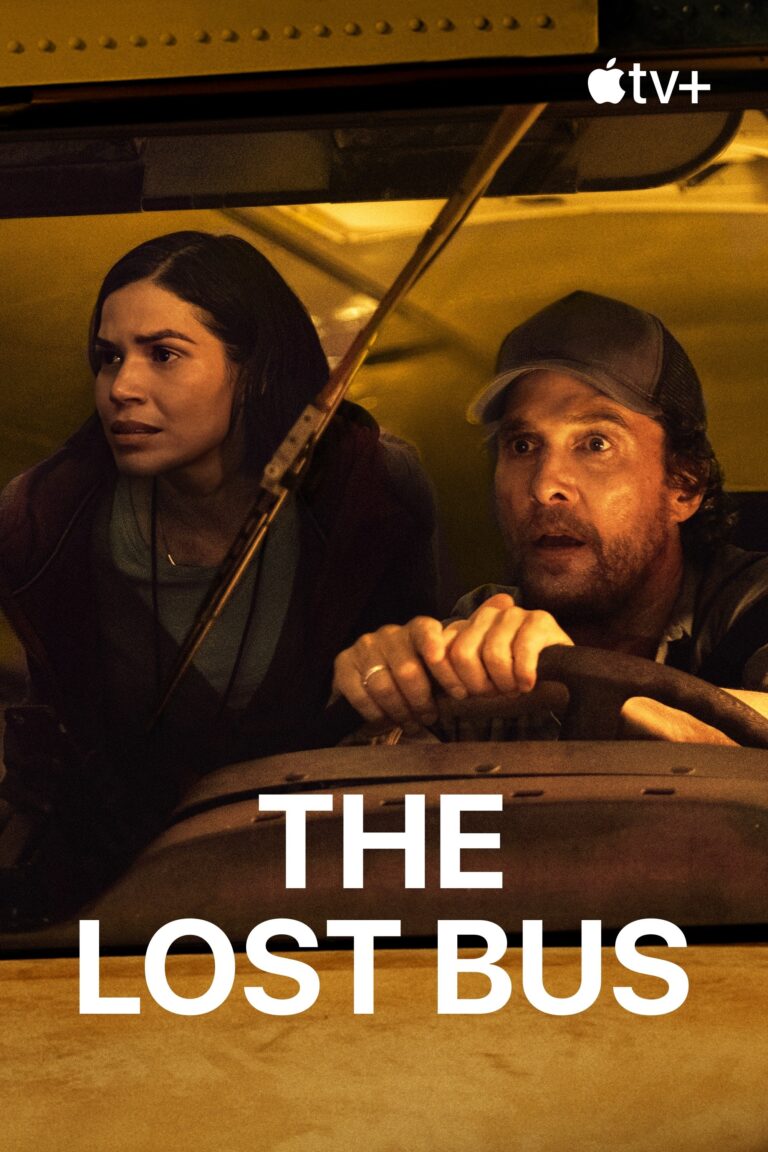
The Lost Bus (2024) is a gripping survival-thriller that explores fear, faith, and the fragility of human nature when pushed to the edge. Directed by Susanne Bier and written by David Koepp, this tense and emotional drama brings together a stellar cast including Florence Pugh, Paul Mescal, and Anya Taylor-Joy. The result is a film that’s as much a psychological character study as it is a high-stakes survival story — one that leaves audiences breathless until the very end.
Plot Summary
The film follows a group of twelve passengers on a cross-country night bus trip that takes a horrifying turn when their vehicle mysteriously veers off a remote mountain road during a storm. With no cell service, limited supplies, and a growing sense of paranoia, the survivors must figure out how to stay alive — and uncover the truth about why the bus crashed in the first place.
Florence Pugh stars as Emma, a med student with a complicated past who quickly becomes the group’s reluctant leader. Paul Mescal plays Jack, a quiet mechanic with a mysterious connection to the bus company, while Anya Taylor-Joy portrays Lila, a social media influencer whose bravado hides deep fear. As tension rises, alliances crumble, and secrets emerge, the survivors realize the crash might not have been an accident — and someone among them may know more than they’re admitting.
Performances
Florence Pugh delivers a powerhouse performance that anchors the film. Her portrayal of Emma — vulnerable yet resilient — gives The Lost Bus emotional depth beyond its thriller surface. Paul Mescal brings a haunting stillness to Jack, perfectly balancing warmth and menace. Anya Taylor-Joy adds intensity and unpredictability, elevating her role beyond the stereotypical “outsider” archetype.
Supporting performances from Jeffrey Wright and Jessie Buckley also shine, with Wright portraying a pragmatic ex-soldier and Buckley playing a desperate mother clinging to hope. Each character feels fully realized, making the ensemble dynamic both believable and compelling.
Direction and Screenplay
Susanne Bier’s direction is taut and atmospheric. She skillfully builds suspense through isolation and silence rather than jump scares or spectacle. Her ability to focus on emotional realism gives The Lost Bus a grounded authenticity that many survival thrillers lack.
David Koepp’s screenplay strikes an impressive balance between psychological tension and human drama. The dialogue feels natural and layered, revealing hidden motives and fears with every exchange. The story’s pacing is deliberate — slow-burning in the first half, explosive in the second — ensuring that every reveal hits with emotional force.
Cinematography and Visuals
Cinematographer Linus Sandgren (La La Land, No Time to Die) captures both the beauty and terror of isolation. The misty mountains and claustrophobic interiors of the stranded bus create a haunting visual contrast. The use of cold, desaturated tones enhances the sense of despair, while moments of sudden light — such as flares or lightning strikes — punctuate key scenes with striking intensity.
Each frame is meticulously composed, turning the bus itself into a character — both a prison and a sanctuary. The camera often lingers on faces rather than actions, allowing emotions to tell the story even when dialogue is scarce.
Music and Sound Design
The haunting score by Hildur Guðnadóttir (Joker, Chernobyl) perfectly complements the film’s tension. Sparse, eerie strings and unsettling low tones create a constant undercurrent of dread. Sound design plays a major role — from the creaking of the bus metal to the echoing winds — immersing viewers in the characters’ fear and confusion.
Moments of silence are used brilliantly, especially in scenes where paranoia sets in. Every sound feels amplified, as though the environment itself is alive and watching.
Themes and Symbolism
At its heart, The Lost Bus is about survival — not just of the body, but of morality and trust. It questions how far people will go when stripped of civilization’s comforts. Themes of guilt, redemption, and leadership run throughout, as Emma grapples with her past while trying to save others.
There’s also a subtle commentary on society’s disconnection: people trapped together, forced to communicate beyond their digital facades. The bus becomes a metaphor for modern humanity — lost, confined, and struggling to find direction in chaos.
Critics’ Reactions
Critics have praised The Lost Bus for its gripping storytelling, emotional performances, and masterful tension-building. Florence Pugh’s performance has been singled out as “Oscar-worthy,” while Bier’s direction has been described as “mesmerizing and suffocating in the best possible way.”
However, a few reviews noted that the film’s pacing in the first act may test impatient viewers. Some also felt that the final twist, while shocking, bordered on over-explained. Still, most agree that The Lost Bus stands out as one of the most emotionally intelligent thrillers of the year.
Audience Response
Audiences have responded passionately to the film’s emotional depth and psychological tension. Many viewers praised its realism and the way it avoids typical Hollywood heroism, focusing instead on flawed, human reactions. Social media buzz calls it “a cross between The Grey and Gone Girl,” applauding its layered mystery and moral ambiguity.
Verdict
The Lost Bus is not just a survival thriller — it’s a raw, haunting look at what happens when fear strips people down to their truest selves. With stunning performances, rich cinematography, and emotionally charged storytelling, it cements itself as one of the standout films of 2024.
It’s the kind of movie that lingers — not because of its shocks, but because of its humanity.
⭐ Rating: 4.5/5
Pros: Exceptional performances, suspenseful direction, haunting visuals, emotional depth
Cons: Slightly slow first act, somewhat predictable final twist